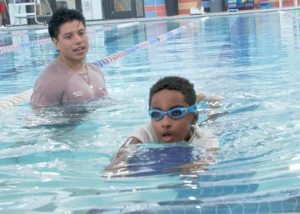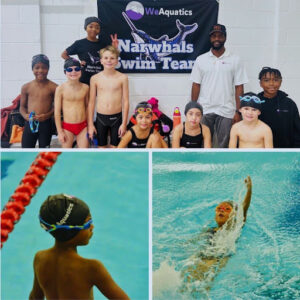In ISR, Training Parents and Children Are Equally Important
Infant Swimming Resource, or ISR, is a swimming self-rescue program for children six months and older. It’s meant to teach children how to roll over from a facedown position in the water, float unassisted, and (according to the child’s age) swim to safety. These skills can help avoid tragedy if little ones unexpectedly fall into water.
What most parents don’t realize, though, is how important they are in this learning process.
4 Reasons Parents Should Make Time to Swim with Their ISR-Trained Children
1. Self-Rescue Is a Skill That Needs to Be Maintained
The ISR program is based on muscle memory. ISR students of all ages practice how to respond to different scenarios, mastering the ability to self-rescue and reducing the chance of panic when something unexpected happens.
This type of training is only maintained or built on if students are allowed and encouraged to keep using their acquired skills—without interruption or unnecessary help from parents.
As a swim school that offers ISR classes with ISR-certified instructors, this is the most important reason we ask parents to join us for follow-up lessons in the pool. If students don’t consistently maintain their skills, they could lose vital, potentially lifesaving progress.
2. Parents Should Practice Doing, Not Just Watching
Many parents don’t realize it, but learning what to do and what not to do while swimming with their children outside of lesson time is actually just as important as the training the students undergo. We aim to teach all our ISR parents what their children look like up close when they’re swimming or floating and how to get the same quality swimming students exhibit in lessons during pool time outside of classes.
It’s relatively easy to watch an ISR instructor administer these skills and help children maintain them. However, parents themselves need to be comfortable enough to have children swim to them or away from them in a way that gives the child the ability to take ownership of his or her swimming, even if the child is unhappy, uncomfortable or upset. After all, real-world situations don’t pause just because the child’s morale is low at the time.
These parent-based lessons teach parents how to not start or foster bad habits. This isn’t always entirely intuitive. That’s why a trained instructor is there to coach the parent on when and how to give assistance in order to honor all the time and effort invested to obtain these lifesaving skills.
3. Parents Need to Know When to Help and When to Let a Child Struggle
To the untrained eye, there are some instances during ISR lessons where it looks as if a student is struggling. In these times, it’s actually more important to give the child supervised space to work through a tricky scenario—even if every fiber in the parent’s body is screaming to help his or her child!
By the same token, parents need to learn how to step in and to help when necessary but without making the children feel as though someone will help or rescue them if a situation is a little more difficult than they’re accustomed to.
These tricky scenarios, if handled correctly, are excellent for broadening a student’s experience, and a student with broad experience is less likely to panic when something occurs that wasn’t specifically simulated in lessons.
We understand this balancing act is emotionally and logistically difficult for parents. It’s arguably one of the hardest things we ask parents to do, but getting it right can increase the chances of the student responding correctly and safely in any water accident.
4. Consistency Equals Success
Another vital reason for parents to practice ISR skills with their children is consistency. When ISR instructors and parents use similar techniques to pick students up or to have the students swim to or away from them, there’s less chance the students will become confused about what’s being asked or required of them in the water. Less confusion and more consistency mean students will continue to take ownership of their own swimming, and this self-reliance and confidence in the water are exactly what these lessons are designed to encourage.
ISR is full of amazing survival stories—just like this one from JoAnn Barnett. It also puts your child on the path to being a lifelong swimmer, which brings with it many benefits.
If you’re interested in learning more about these lessons or have any questions about what they entail, please don’t hesitate to reach out. We’re happy to answer any questions or concerns you have about these important lifesaving lessons.




